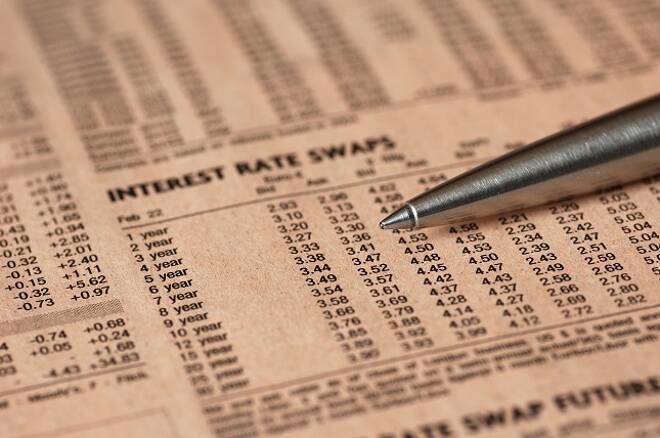Advertisement
Advertisement
U.S Mortgage Rates Stay Flat as Geopolitics and COVID-19 Overshadow the Stats
By:
In a shortened week ahead, Trump and COVID-19 could deliver more downward pressure on mortgage rates. Demand may also slide, however...
Mortgage rates were flat in the week ending 25th June, following the previous week’s 1st decline in 3 weeks.
30-Year fixed rates remained unchanged at an all-time low 3.13% following an 8 basis points fall in the week prior.
Compared to this time last year, 30-year fixed rates were down by 60 basis points.
30-year fixed rates were down by 181 basis points since November 2018’s most recent peak of 4.94%.
Economic Data from the Week
Economic data was on the busier side through the 1st half of the week.
Key stats included prelim June private sector PMI figures, May’s durable goods and core durable goods orders, and the weekly jobless claims figures.
While durable goods and core durable goods orders bounced back in May, the weekly jobless claims disappointed.
In the week ending 19th June, initial claims jumped by 1.48m following a 1.508m increase in the week prior.
The figures suggested that a recovery in the labor market would likely be lower than anticipated.
Early in the week, June’s prelim private sector PMIs had given riskier assets a boost. The manufacturing PMI rose from 39.8 to 49.6, with the services PMI up from 37.5 to 46.7.
Stats skewed to the positive was not enough to give mortgage rates a boost, however.
Risk aversion in the week, stemming from a spike in new COVID-19 cases contributed to the hold on mortgage rates. There was also a threat from the U.S of tariffs on EU goods, with particular focus on France, Germany, Spain, and even the recently departed UK…
Freddie Mac Rates
The weekly average rates for new mortgages as of 25th June were quoted by Freddie Mac to be:
- 30-year fixed rates remained unchanged at 3.13% in the week. Rates were down from 3.73% from a year ago. The average fee also remained unchanged at 0.8 points.
- 15-year fixed increased by 1 basis point to 2.59% in the week. Rates were down from 3.16% compared with a year ago. The average fee remained unchanged at 0.8 points.
- 5-year fixed rates slipped by 1 basis point to 3.08% in the week. Rates were down by 31 points from last year’s 3.39%. The average fee increased from 0.4 points to 0.5 points.
According to Freddie Mac:
- It took more than 10-years for purchase demand to recover from pre-global financial crisis levels. In the COVID-19 crisis, it took less than 10-weeks.
- The rebound in purchase demand partly reflects deferred sales as well as continued interest from prospective buyers looking to take advantage of the low mortgage rate environment.
Mortgage Bankers’ Association Rates
For the week ending 19th June, rates were quoted to be:
- Average interest rates for 30-year fixed, backed by the FHA, increased from 3.33 to 3.35%. Points decreased from 0.23 to 0.22 (incl. origination fee) for 80% LTV loans.
- Average interest rates for 30-year fixed with conforming loan balances remained unchanged at 3.30%. Points rose from 0.29 to 0.32 (incl. origination fee) for 80% LTV loans.
- Average 30-year rates for jumbo loan balances decreased from 3.67% to 3.62. Points increased from 0.28 to 0.29 (incl. origination fee) for 80% LTV loans.
Weekly figures released by the Mortgage Bankers Association showed that the Market Composite Index, which is a measure of mortgage loan application volume, fell by 8.7% in the week ending 19th June. In the week prior, the Index had risen by 8.0%.
The Refinance Index slid by 12% from the previous week and was up by 76% from the same week one year ago. In the previous week, the Refinance Index had risen by 10%.
The refinance share of mortgage activity decreased from 63.2% to 61.3% of total applications in the week ending 19th June. In the week prior, the share had increased from 61.3% to 63.2% of total applications.
According to the MBA:
- Mortgage applications fell by 9%, with both refinance and purchase activity declining despite 30-year fixed rates holding at 3.30%.
- Refinance applications fell to their lowest level in 3-weeks.
- In spite of the decline, the MBA still expects refinance originations to increase to its highest level since 2012.
- The MBA also noted that the purchase market was strong, even with high unemployment and economic uncertainty.
- Activity has climbed for five straight weeks to above year-ago levels.
- The MBA noted, however, that supply may pin back growth in the months ahead.
For the week ahead
It’s another relatively busy 1st half of the week for the Greenback.
Key stats from the U.S include consumer confidence, ADP nonfarm employment change, and ISM Manufacturing PMI numbers.
In a shortened week, June’s nonfarm payrolls, unemployment rate, and the weekly jobless claims are due out on Thursday.
While we can expect the stats to influence market risk sentiment and yields, COVID-19 and geopolitics will likely be the key drivers.
After last week’s news of a number of U.S states hitting pause on reopening, a continuing trend would pin mortgage rates back further.
With the U.S President looking to distract voters, we can expect plenty of chatter from Trump.
Will Trump deliver on the threat of tariffs for the EU and walk away from the U.S – China trade agreement? The latter may be less likely but certainly not unfeasible…
About the Author
Bob Masonauthor
With over 28 years of experience in the financial industry, Bob has worked with various global rating agencies and multinational banks. Currently he is covering currencies, commodities, alternative asset classes and global equities, focusing mostly on European and Asian markets.
Advertisement
